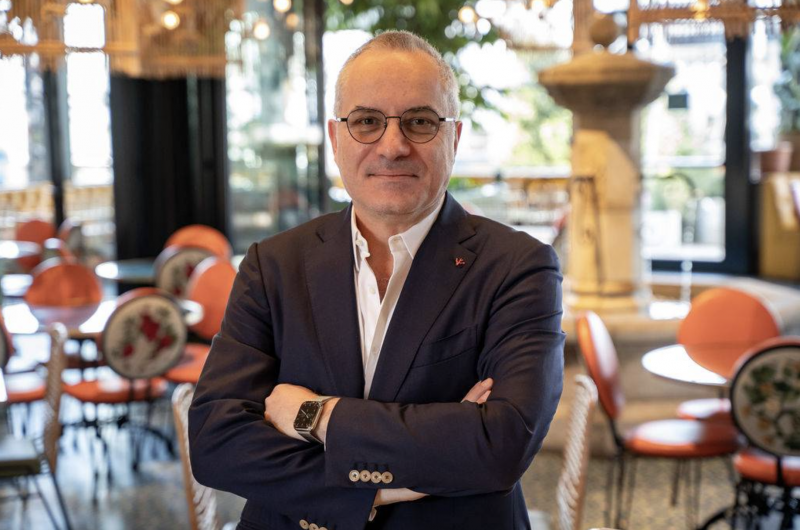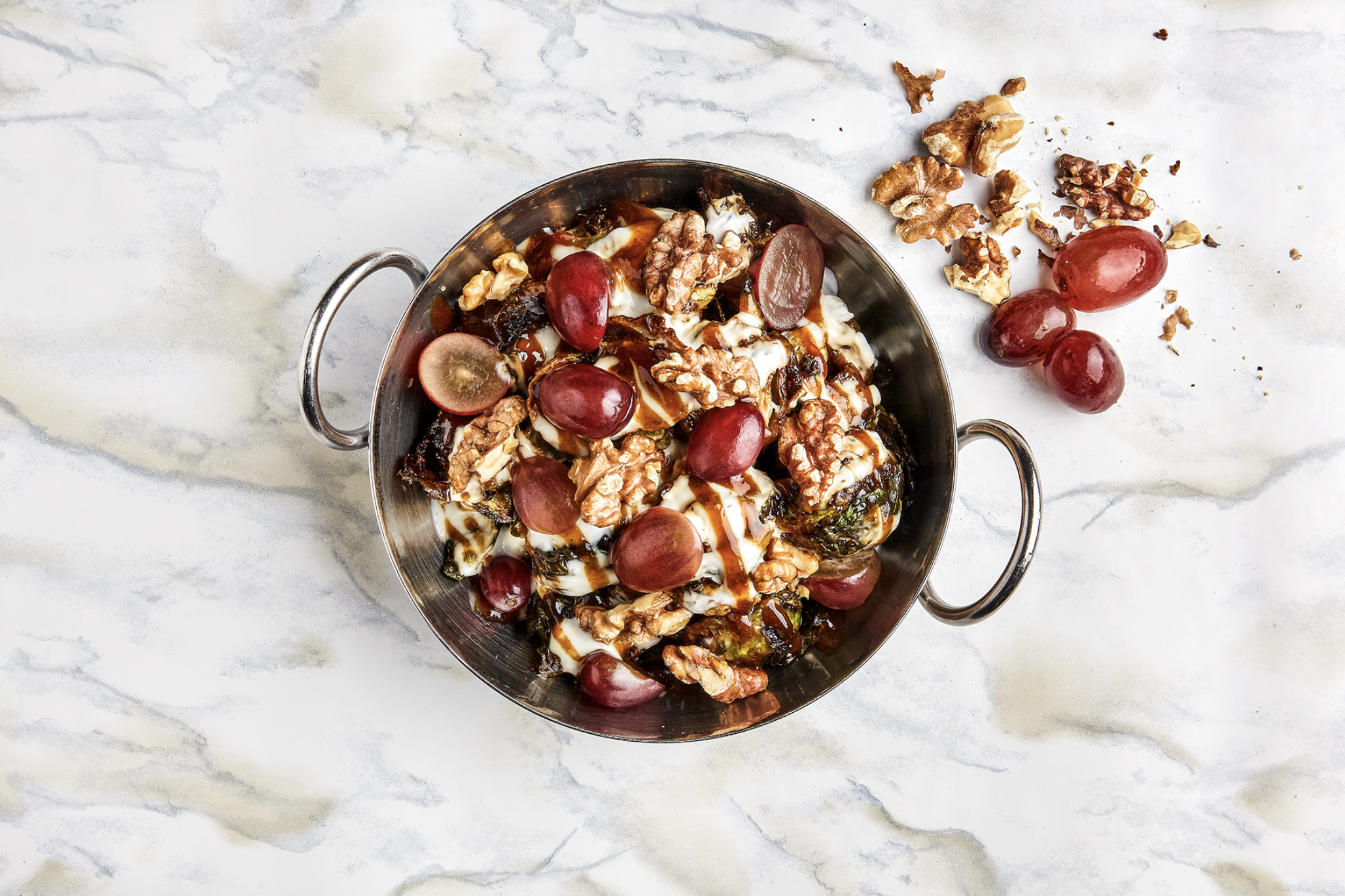
Philippe Massoud, the man behind the success of his ilili restaurants in New York and Washington.
Philippe Massoud's passion has always centered around his home country, Lebanon. He cherishes his childhood memories of days spent at Coral Beach, his father George’s prestigious seaside resort—a symbol of the country's golden age. Despite losing his father during the brutal Civil War, nothing has diminished Philippe’s unwavering self-belief. In fact, the various experiences that have marked his professional and personal life have only strengthened his determination to achieve his goals.
As a teenager, Philippe Massoud emigrated to the United States to pursue his studies at Cornell University in New York. He graduated with a Bachelor's degree in Hotel and Restaurant Development from the Rochester Institute of Technology.
Now based in both New York and Washington DC, Philippe, CEO, executive chef and owner of International Hospitality Investments, LLC, oversees the day-to-day operations and expansion strategies of ilili restaurant. He established this fine-dining establishment in New York in 2007 and recently opened a second location in Washington, DC. The opening of ilili DC, fifteen years after its New York counterpart, paves the way for further expansion in the future.
The restaurant's success is mainly attributed to a menu that has "elevated Lebanese culinary traditions and hospitality values to the level of other international cuisines."
Ilili, which means "tell me" in Arabic, was “a name suggested to me by two friends while the three of us were chatting on the Internet," he tells L'Orient-Le-Jour. “I was looking for a name that would stand out from the crowd, given the modern style of the restaurant. The icing on the cake with this name was that ilili satisfied the affinity I've always had for palindromes (words that can be read in both directions), both in letters and numbers.”
(See our 8 questions to Philippe Massoud below.)
Philippe Massoud’s Brussels sprouts
Category: starter or main course
Preparation time: 30 minutes
Cooking time: 10 minutes
Total time: 30-45 minutes
Serving: 4 people
Difficulty level: easy
Ingredients
500 grams Brussels sprouts
1 tbsp. chopped fresh mint
1 cup plain yogurt
3/4 tsp. salt
1/2 cup Lebanese fig jam
1/4 cup water
1/2 cup chopped toasted walnuts
1/2 cup seedless green or red grapes, halved
4 tbsp sherry vinegar - or more to taste
1.25 tsp. salt
Preparation
Step 1: For the fig puree
In a saucepan, combine 1/4 cup water with the Lebanese fig jam. Bring to the boil, then purée in a blender.
Step 2: For the mint yoghurt
Mix the yogurt, chopped mint and ¾ of a tsp. of salt.
Step 3: Remove the outer skins of the Brussels sprouts, otherwise they burn and fall off, which is unpleasant and difficult to remove from the rest of the batch.
Step 4: Fry the Brussels sprouts or sauté them cut side down in a pan until golden brown (almost burnt) or toss with oil and roast in a 260°C oven until crisp.
Step 5: Combine fried, seared or roasted Brussels sprouts with sherry vinegar and 1.25 tsp. salt.
Step 6: Add the two sauces in a criss-cross pattern, then garnish with walnuts and grapes and just before serving, add fresh mint. Don't overdress, you can always add more later if necessary.
Step 7: Perfecting the seasoning is key to achieving the perfect bite - balance bitterness, salt, sweetness, acid and umami.
Tip: Brussels sprouts should always be green with golden outer leaves when cooked. They should not be completely browned, otherwise they will be bitter and too saturated with frying oil.
 Brussels sprouts, proven to be a big hit at ilili.
Brussels sprouts, proven to be a big hit at ilili.
8 QUESTIONS FOR PHILIPPE MASSOUD
1. Can you tell us about the restaurant?
In 2007, we set up ilili in New York's Flatiron District, and in 2023 a second restaurant in Washington DC's Wharf, where we invite our customers to savor both modern and traditional Lebanese cuisine. Our mission is to blend different cultures and ways of thinking through culinary art, infusing passion and generosity into every dish. We want to create a dialogue between Lebanese, Levantine and Mediterranean cuisine and the vibrant energy of New York.
2. Can you share a few words about your chefs and their cuisine?
Over the past 16 years, we've trained several chefs, all of whom were originally American but are now American-Lebanese. They have skilfully integrated Lebanese cuisine into their culinary repertoire. We are very proud that non-Lebanese chefs are able to interpret and use Lebanese culinary traditions so expertly.
3. What inspires your menu? Do you change it regularly?
Our menu is a tribute to the most authentic Lebanese cuisine outside Lebanon. We believe it's essential to curb the trend towards mass-produced, hastily-prepared Lebanese cuisine. Our philosophy is to change the perception of Lebanese cuisine from fast food to a culinary experience that demands meticulous attention and effort. We update our menu with the seasons, generally refreshing 20-30 per cent of our offering while preserving the authenticity of our cuisine.
4. Sweet or savory?
My culinary journey began at an early age when I cut my fingers peeling an orange while trying to imitate my father! And then, at the age of 8 or 9, I found myself immersed in a bowl of chocolate, no doubt the beginning of a lifelong fascination with desserts. Yet while I still have a deep connection with the sweet creations of my childhood, as an adult I'm drawn to the precision and consistency that savory cuisine demands. At the end of the day, sweet and savory each have their own charm in the culinary world.
5. What's your favorite recipe and why?
When nostalgia comes over me, my heart always longs for "kebbé bi laban," Aleppo-style. This exquisite dish combines a delicate chicken broth with laban, shredded chicken and olive oil.
6. What is your relationship with Lebanon and Lebanese cuisine?
I'm very proud to have helped raise Lebanese cuisine to the level of other world cuisines, despite the doubts of skeptics. My attachment to Lebanon is deep and rooted at a molecular level. However, the country can sometimes feel broken, and it's clear that Lebanon can't go on like this.
7. Why did you choose to share this recipe?
Brussels sprouts are one of our most popular dishes and have won over a passionate following. We're delighted to share this recipe with the readers of L'Orient-Le Jour to introduce them to our Lebanese cuisine.
8. What's next?
Our mission has driven the growth of our company—to tell stories and showcase our heritage. Although financial success has followed, our main objective remains to bring the Lebanon of our dreams to a wider audience. We are currently negotiating for multiple new sites in 2025 and 2026.
This article was originally published in L'Orient-Le Jour.